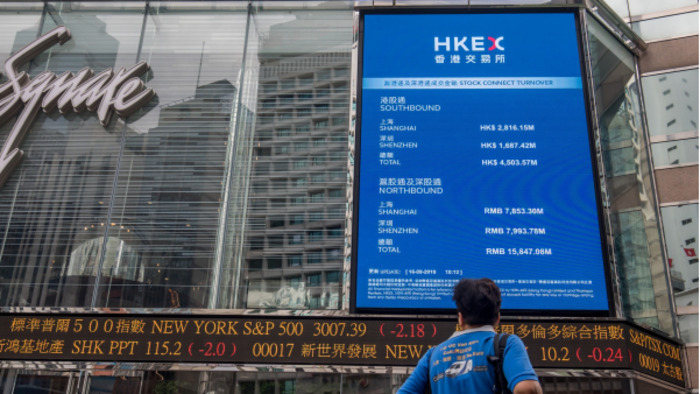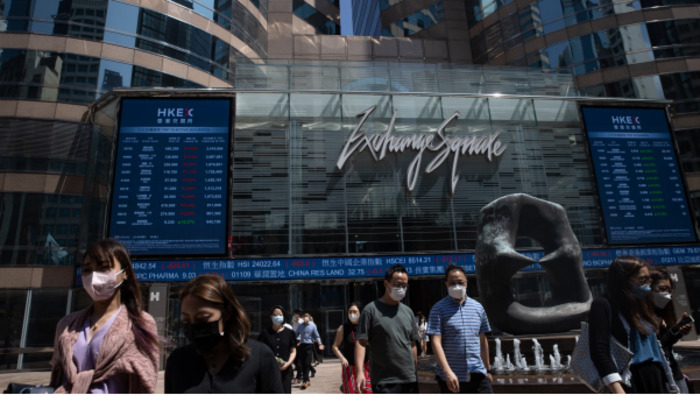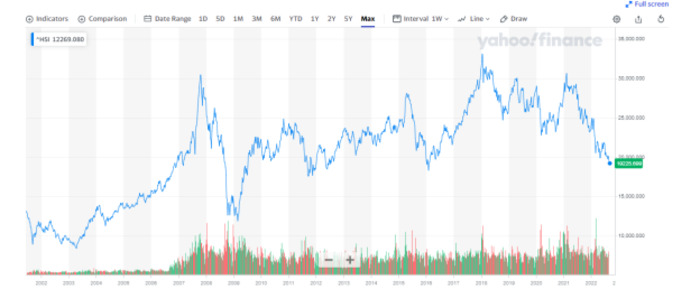An analysis of the Hong Kong Hang Seng Index! Hang Seng Index trend?
 2022-09-07
2022-09-07
 2754
2754
Hang Seng Index Introduction

Image source: ft
Hang Seng Index Background
There are stock markets around the world An index that systematically reflects the overall dynamics of the stock market, and Hong Kong is no exception. Hong Kong's Hang Seng Index (Hang Seng Index) is not only an indicator of the overall market trend of Hong Kong stocks, but also one of the world's most important indices, which is implicated in the global economy and major indices. For this reason, international investors are also very concerned about the Hang Seng Index. Internationally, the Hang Seng Index is often referred to as HSI (^HSI).
Hang Seng Index History
Hang Seng Index was founded in 1964 by Guan Shiguang, head of research at Hang Seng Bank. At that time, the Hang Seng Index was not disclosed to the public and was only used for internal reference. It was not published until 1969 after it was compiled by the Hang Seng Index Co., Ltd., a subsidiary of Hong Kong Hang Seng Bank. With the rapid development of Hong Kong's economy in the past few decades, it has become the largest financial center in Asia, and the Hang Seng Index has also been favored by international investors. Today, Hong Kong's Hang Seng Index, like Japan's Nikkei 225 Index, is internationally recognized as a representative index of Asian financial markets.
The Hang Seng Index has a history of more than half a century. When it was first launched, it was only quoted once a day, but now it has been quoted every two seconds. The Hang Seng Index Company has also compiled and managed a series of indices in the Hong Kong Stock Exchange from the calculation and compilation of the Hang Seng Index to the present, such as the Hang Seng Technology Index and the Hang Seng Mainland China Composite Index.
What are the constituent stocks of the Hang Seng Index
Number of constituent stocks
The constituent stocks of the Hang Seng Index are basically all on the main board of the Hong Kong Stock Exchange Listed company stocks with the largest market capitalization, the most active trading volume, and the most representative industry. Hang Seng Indexes conducts quarterly reviews to make adjustments to a range of indices. The number of Hang Seng Index constituents will increase from 69 to 73, effective September 5, 2022. The number of constituents is targeted to reach 80 constituents by mid-2022, with a final target of 100 constituents.
Constituent Qualifications
In order to become a candidate constituent stock, each company stock must meet certain qualifications. For example, a new constituent stock must Pass the turnover test in at least 10 months in the last 12 months, and pass the liquidity test in the last 3 months. Existing constituents have another set of prerequisites.
That said, it's not enough to be listed on the HKEX and have a lot of trading volume. In addition to the turnover rate and liquidity just mentioned, there are many other complex conditions that need to be met. In addition, the special purpose acquisition of company shares is not eligible for inclusion in the Hang Seng Index Series even if all conditions are met.
Constituent stock calculation method and stock selection principles
In general, stock selection principles are industry group representation, market capitalization, turnover, and financial performance. Constituents are currently limited to 10% to 15%, with an ultimate target of 10%. After considering the above factors, the Hang Seng Index Advisory Committee will finally decide the constituent stocks on a quarterly basis.
Key factors affecting the trend of the Hang Seng Index
Hong Kong's own economic conditions
Since it is an important indicator representing the Hong Kong stock market and economic conditions , of course, the biggest key factor affecting the trend of the Hang Seng Index is Hong Kong's own economic environment.
Influence on the Mainland Market
The Hong Kong Stock Exchange includes many Chinese companies. Naturally, Chinese companies are also included in the Hang Seng Index. Chinese-funded enterprises that can basically meet the listing requirements of the Hong Kong Stock Exchange are usually very large enterprises in the mainland. Therefore, the economic environment of the mainland market and changes in various industries will also have a certain impact on the Hang Seng Index.
In addition, the mainland stock market also guides the Hang Seng Index to a certain extent. In the past, when the mainland market fell sharply due to the Sino-US trade dispute, the trend of the Hang Seng Index at that time also corresponded to the mainland stock market.
In addition, mainland investors have become increasingly active in the Hong Kong stock market over the past decade, so the market sentiment of mainland investors has also become an important factor that cannot be ignored. Since the "connection" between China and Hong Kong in 2014, a large amount of RMB has flowed into the Hong Kong stock market. According to data from the Hong Kong Stock Exchange, the transaction value of RMB on the Hong Kong Stock Exchange in August 2022 is close to 1 trillion yuan, and its influence on Hong Kong stocks cannot be ignored.
The impact of the US stock index
People who usually pay attention to the Hang Seng Index may have observed that the opening trend of the Hang Seng There is a certain degree of correlation between the direction of the major index stocks. For a long time, many professional traders and investors have used the US stock index as a reference indicator for the trend of the Hang Seng Index.
This is actually because the Hong Kong stock market has been favored by foreign and institutional investors in the past. The risk control of these large investors and the general environment in the market will prompt them to take action. However, after the interconnection between China and Hong Kong, mainland capital has begun to replace foreign capital as the main driving force affecting the trend of Hong Kong stocks. Now Hong Kong stocks are less and less affected by the US stock index, but they still have a certain impact on the opening trend.
International Events
Hang Seng Index, as one of the world's major indices, suffers along with other major indices when major international emergencies occur. . So how big does it have to be to be big? Generally speaking, as long as it is so big that the major U.S. indexes fall in response, the Hang Seng Index falls sharply next.
Renminbi exchange rate fluctuations
The impact of the Renminbi exchange rate on the Hang Seng Index is divided into two parts: First, the fluctuation of the Renminbi exchange rate actually reflects to a certain extent Whether the market is optimistic about the growth of China's economy, so this returns to the speculation on the prospects of China's economic environment. Second: In terms of market performance in the past few years, when the renminbi appreciates, more renminbi flows southward into the Hong Kong stock market, while when the renminbi depreciates, funds flow out of Hong Kong. It can be seen that mainland investors have the habit of using the Hong Kong stock market to preserve the value of the RMB, which also provides a clue for the trend of the Hong Kong stock market.

Image source: aljazeera
Is it a good time to invest in the Hang Seng Index?
Invest v.s trading
< p>Before deciding when to enter the market, one of the most important questions investors need to ask is the question to themselves: "Am I investing, or am I trading?". Everyone may have heard that the uncle of a friend of a friend bought a certain stock decades ago, and now the value of this stock has risen. This is actually the ultimate goal of investment. Investors need to be psychologically prepared. The money invested now may take more than ten or twenty years to bear fruit. With this mental preparation, the only decision point for entering the market is the view on the future global and Greater China economic environment.In the case of transactions, that's another story.
With the recovery of the global economy, the restart of the production chain and the more active global business activities, Hong Kong, as an important financial and commercial center in Asia, must also ride on the global environment. It is good, but it has also dropped all the way to the point where it can start to pick up cheap prices. The future medium and long-term performance is worth looking forward to.
Hang Seng Index Historical Chart & Analysis
Historical Trend
It can be seen from the Hang Seng Index 20-year chart, The Hang Seng Index fell slightly after reaching a new two-decade high in 2018, before recovering in 2021 and all the way down. According to the historical data of the Hang Seng Index, the Hang Seng Index has reached a ten-year low at this time, and the upside has also expanded.

Image source: FINANCE.YAHOO.COM
2022 Hang Seng Index Trend Forecast
Positive to Go
Although the Hang Seng Index has fallen to its lowest level since mid-March, the performance of the major Asian stock indexes is relatively backward. Market experts believe that this is mainly due to the uncertain market conditions.
Nevertheless, Hong Kong stocks are not without things to look forward to. Fang Xinghai, vice chairman of the China Securities Regulatory Commission, said recently that the China Securities Regulatory Commission will launch a new plan with Hong Kong’s financial management department and other relevant departments to expand the subject of the Shanghai-Shenzhen-Hong Kong Stock Connect and include foreign companies listed in Hong Kong as the subject of the Shanghai-Shenzhen-Hong Kong Stock Connect.
The Shanghai-Shenzhen-Hong Kong Stock Connect will have a very significant impact on Hong Kong stocks after the launch. Generally, investors in mainland China usually have limited ways to invest in foreign companies. Therefore, foreign companies listed in Hong Kong will be included in Shanghai Stock Connect. The Shenzhen-Hong Kong Stock Connect target will inevitably attract more mainland funds.
Summary of ways to invest in the Hang Seng Index
Hang Seng Subsidiaries and ETFs
The most direct way to invest in the Hang Seng Index is through Although it is the most direct way for Hong Kong and US brokers to purchase constituent stocks or index ETFs, it may be time-consuming and laborious to open an account across borders.
Hang Seng Index Futures
For those who do not have a foreign brokerage account, investing in Hang Seng Index Futures or Hang Seng Index Night Futures is definitely the best way to convenient way. Although you can also invest through foreign futures dealers, you can also use domestic re-entrustment to invest. Although domestic re-entrustment is convenient and the cost is relatively high, if there is a need for frequent trading, it is best to choose a foreign futures broker, which also has advantages in terms of trading volume and liquidity.
Hang Seng Index Contracts for Difference (CFD)
In recent years, CFDs have become more and more popular with global investors who want to invest in Hong Kong Hang Seng Index Investors can also consider using CFD to operate. The biggest feature of CFD is margin trading. Investors can expand their profits and increase the utilization rate of investment funds. Margin trading, also known as CFD, is leveraged trading, so petty bourgeois can also enter the market, and the investment threshold is lower than other financial instruments and asset trading.
Summary
Investing in indices to see the overall environment
Whether you are investing in the Hang Seng Index or other stock market indices, you should first What we need to do is to understand the economic environment of the country and region where we are located, and to act according to our own economic situation and economic goals.
Comparison of different investment methods and fees
There are various ways to invest in the Hang Seng Index, learn about each method and the brokerage fee system to find the most suitable one It also becomes more important to invest in yourself, and in the least expensive way. This not only increases returns, but also reduces losses. After all, the fees involved in investing are also part of the cost of investing.
The above information is provided by special analysts and is for reference only. CM Trade does not guarantee the accuracy, timeliness and completeness of the information content, so you should not place too much reliance on the information provided. CM Trade is not a company that provides financial advice, and only provides services of the nature of execution of orders. Readers are advised to seek relevant investment advice on their own. Please see our full disclaimer.

CM Trade
As a world leading financial trading platform, CMtrade Provides comprehensive one-stop trading services and opportunities for traders.
[Products]
The platform provides over 32 kinds of popular financial products such as forex, precious metals, crude oil, indices, cryptocurrencies and more.
[System]
2 top trading systems CM Trade MT4 / CM Trade APP, powerful and easy to operate
[Service]
Comprehensive market news, professional market analysis, 7*24 hours online customer service
[Advantage]
Low cost, high leverage, flexible one-stop all day two-way trading.
[Authority]
Licensed and strictly regulated by authorities. Traders deposits are independently kept by the bank. Fast deposit and withdrawal. Fair, efficient and transparent trading environment.
CM Trade Mobile Application
Economics Calendar
MoreYou May Also Like



 简体中文
简体中文
 ภาษาไทย
ภาษาไทย
 繁體中文
繁體中文
 Indonesia
Indonesia











